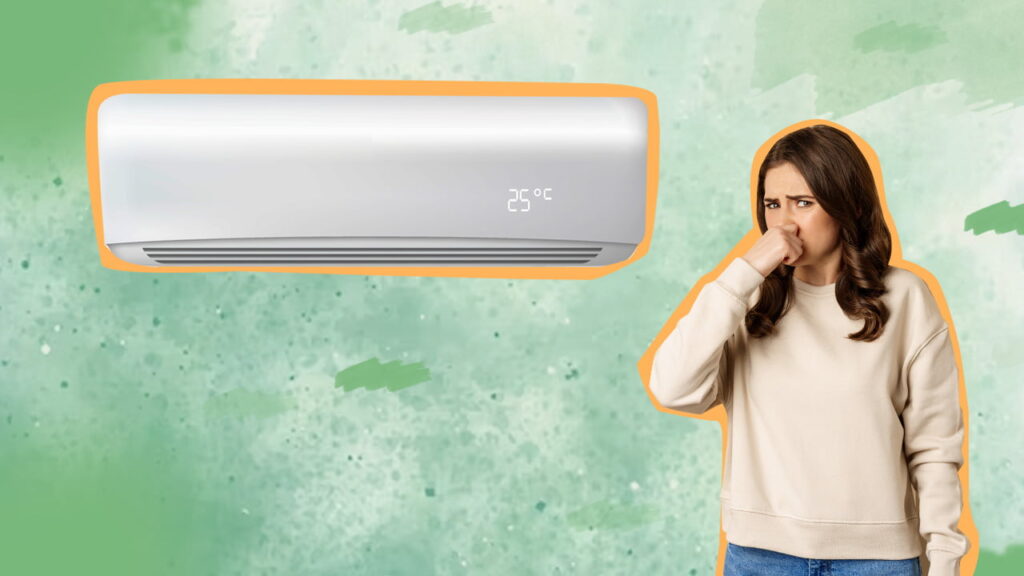There’s nothing quite as off-putting as switching on your air conditioner on a hot day, only to be greeted with a foul smell. Not only does it ruin the comfort of your space, but it can also be a sign that something’s wrong inside your system. A smelly air conditioner isn’t just an inconvenience—it could indicate mold growth, mechanical issues, or accumulated dirt, all of which can impact your health, energy efficiency, and the lifespan of the unit.
In this blog, we’ll explore the common causes behind unpleasant AC odours, how to fix them, and steps you can take to prevent them from returning.
Common Air Conditioner Smells and What They Mean
1. Musty or Moldy Smell
This is the most common odour reported by homeowners. It usually indicates the presence of mould or mildew inside the AC system, typically in the evaporator coils, ductwork, or drain pan. High humidity levels and lack of maintenance often lead to moisture build-up, creating the perfect breeding ground for fungi.
2. Rotten Egg Smell
If your air conditioner emits a smell like rotten eggs or sulphur, it could signal a gas leak—particularly if your HVAC system also involves gas heating. In some cases, it might be caused by a dead rodent or insect trapped in the ducts.
3. Dirty Sock Smell
Yes, it’s exactly what it sounds like—a foul, sweaty smell. This is often caused by bacteria and mold buildup on the evaporator coils, especially when the system sits unused for some time. When moisture combines with dirt and debris on the coils, it can result in that unpleasant locker room-like odour.
4. Burning or Electrical Smell
A burning smell might indicate that a motor is overheating or that wiring or insulation is damaged. If your system emits a burning plastic or rubber smell, switch it off immediately to avoid fire hazards and call a technician.
5. Chemical or Acetone Smell
A sharp chemical scent might indicate a refrigerant leak. Refrigerants are chemicals that cool the air in your home, and leaks are not only dangerous to your health but also harmful to the environment.
Why It’s Important to Address the Smell Immediately
Health Risks: Prolonged exposure to mold spores or chemical fumes can cause respiratory issues, allergies, and other health problems, especially in children and elderly individuals.
Reduced Efficiency: A clogged or malfunctioning system has to work harder to cool your home, leading to higher energy consumption and utility bills.
Long-Term Damage: Ignoring bad smells can lead to corrosion, component failure, and costly repairs down the road.
Impact on Air Quality: Foul smells often come with airborne contaminants that degrade the overall indoor air quality in your home.
How to Fix a Smelly Air Conditioner
Step 1: Turn Off the AC System
Before inspecting your unit or addressing the issue, switch off your air conditioner completely to ensure your safety.
Step 2: Inspect and Replace the Air Filter
A dirty or clogged air filter is one of the most common causes of bad smells. Check your filters—if they’re discoloured or full of dust, replace them. Regular replacement (every 1-3 months) can significantly reduce odour issues and improve air quality.
Step 3: Clean the Evaporator Coils
The evaporator coils, located inside the indoor unit, are prone to mold and bacterial growth due to condensation. Cleaning them involves removing the panel and gently wiping them down with a soft brush or coil cleaner. If the coils are heavily soiled or inaccessible, it’s best to call a professional.
Step 4: Clear Out the Condensate Drain Line
This drain removes the moisture your system collects during operation. If it becomes clogged with algae or debris, water backs up and creates a musty smell. Use a wet/dry vacuum to suck out the blockage or pour a mixture of warm water and mild detergent into the line to flush it.
Step 5: Check for Dead Animals or Debris
Sometimes, small animals like rodents or birds can find their way into ductwork or outdoor units and get trapped. When they decompose, the smell can be unbearable. If you suspect this, it’s best to have your ducts inspected and cleaned professionally.
Step 6: Look for Signs of Electrical Problems
If the smell is burnt or chemical-like, there may be an electrical short or overheating part inside the system. Never try to fix wiring or internal components yourself. Turn off the unit and contact a licensed technician immediately.
Step 7: Duct Cleaning
Over time, dust, pet dander, mold, and even pests can build up in your ducts. A full duct cleaning can eliminate bad smells and improve airflow. This service is recommended every few years or sooner if you’ve noticed odours or decreased system performance.
Preventive Measures to Keep Your AC Smelling Fresh
1. Schedule Regular Maintenance
Having your air conditioner professionally serviced at least once a year is the best way to catch problems before they start. A technician can clean the internal parts, check for leaks, and ensure your system runs smoothly and efficiently.
2. Use High-Quality Filters
Cheap filters may trap only large particles and allow bacteria, dust, and allergens to pass through. Invest in high-efficiency filters that trap more contaminants and reduce the potential for foul odours.
3. Keep the Area Around Your Outdoor Unit Clean
Leaves, dirt, animal droppings, and standing water near the outdoor condenser can contribute to odour problems. Keep the space clear and clean to prevent airflow blockages and bacterial buildup.
4. Run the Fan Mode Occasionally
When not in use, run your system’s fan for 15-20 minutes weekly. This helps air circulate through the ducts and prevents stagnant air, reducing moisture and odour formation inside the unit.
5. Use a Dehumidifier
In humid climates, excess moisture in the air can cause mold growth inside your unit. A dehumidifier keeps the indoor air dry, especially in basements or areas with poor ventilation.
6. Consider UV Light Installation
Some HVAC systems can be equipped with UV lights inside the ductwork or near the coils. These lights kill bacteria, mold, and other microorganisms, helping to prevent odour and improve air quality.
When to Call a Professional
While many minor odour issues can be resolved with simple cleaning or filter replacements, some problems require a trained eye. Call an HVAC technician if:
The smell persists after cleaning and filter replacement.
You suspect a refrigerant or gas leak.
You notice signs of mold infestation inside ducts or coils.
You hear unusual noises or experience inconsistent cooling.
Final Thoughts
A smelly air conditioner is more than just an annoyance—it’s a signal that your system needs attention. Whether it’s mold, mechanical faults, or a clogged drain, ignoring it can lead to health issues, higher energy bills, and permanent damage to your unit. By staying vigilant, performing regular maintenance, and addressing odours promptly, you can keep your home cool, fresh, and healthy all year round.
If the problem seems beyond your reach, don’t hesitate to call in a professional. A fresh-smelling home begins with a clean, efficient air conditioning system.

